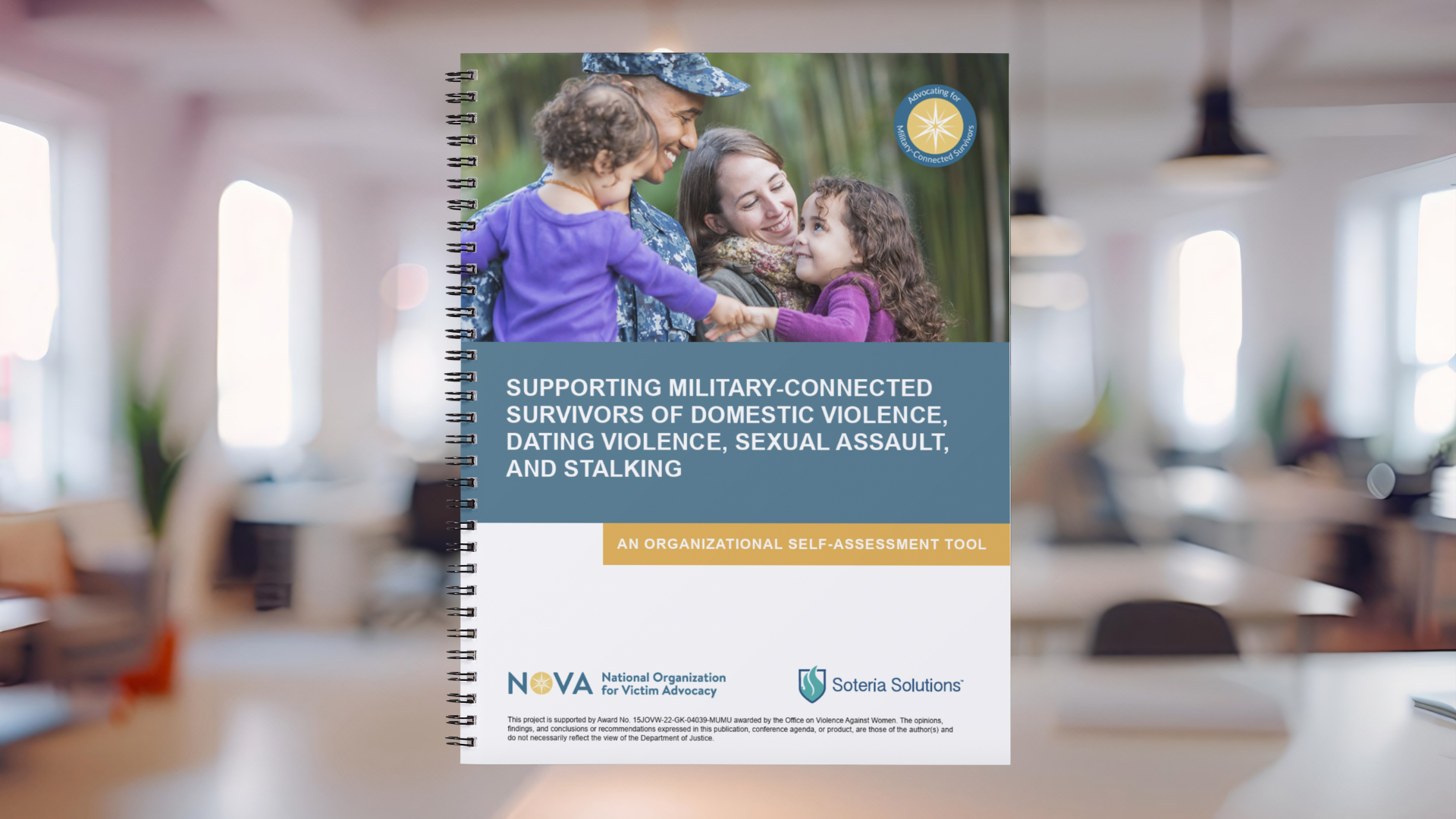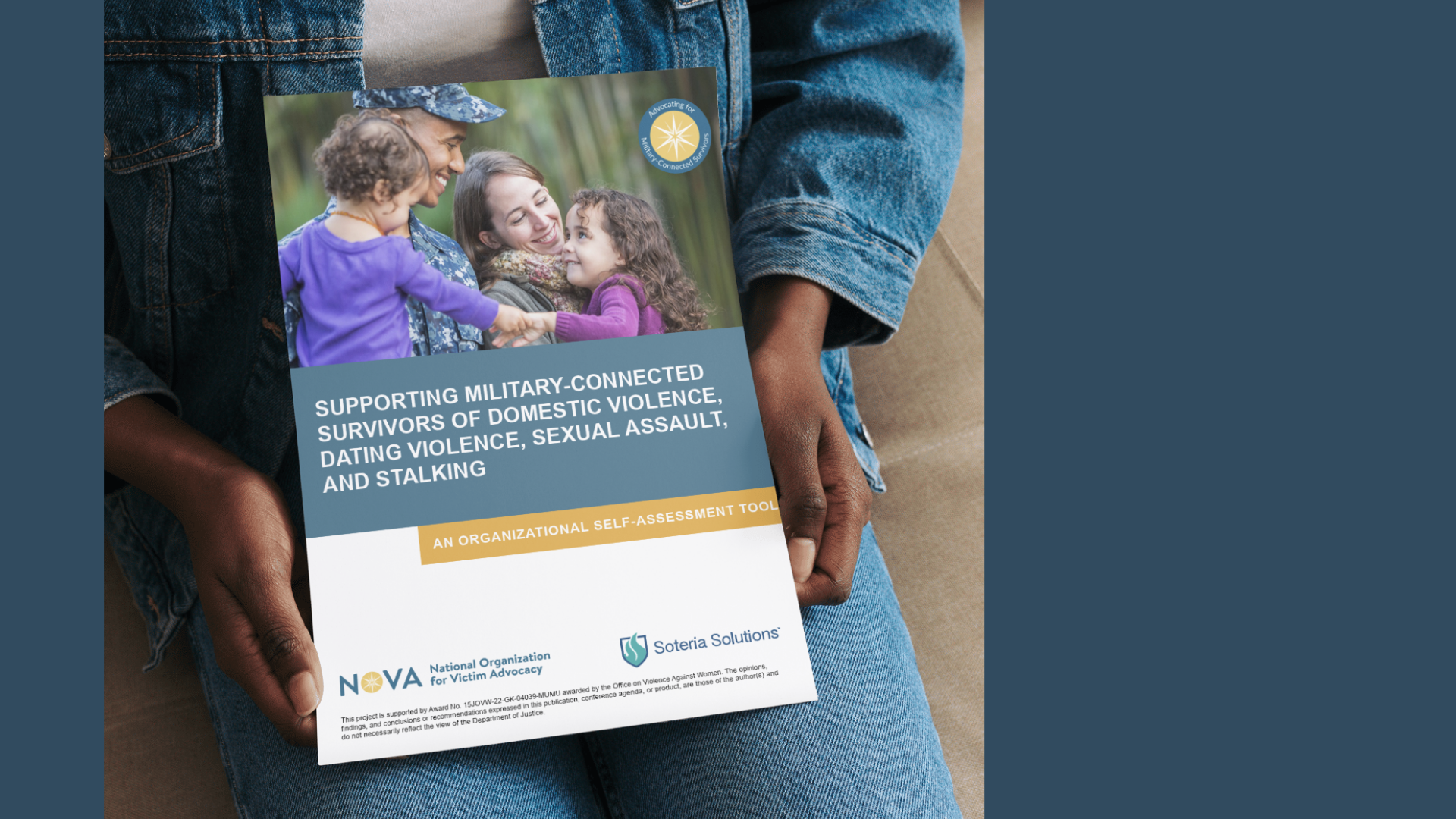Building Better Support for Military-Connected Survivors Through Organizational Self-Assessment
By Lee Helmken Cherry, MPH, CHES
Soteria Solutions is excited to share a powerful new tool created in collaboration with the National Organization for Victim Advocacy (NOVA): the Supporting Military-Connected Survivors of Domestic Violence, Dating Violence, Sexual Assault, and Stalking (DVSAS) Organizational Self-Assessment Tool (referred to going forward as ‘Organizational Self-Assessment Tool’). This free, publicly available resource empowers civilian agencies to reflect on and strengthen how they support survivors of DVSAS who are connected to the military ('military-connected survivor’¹).
Why this Assessment?
From 2023 to 2025, Soteria Solutions worked as a sub-contractor on NOVA’s Office on Violence Against Women (OVW)² funded project to support military-connected survivors of domestic and sexual violence. This project aims to provide trauma-informed, survivor-centered, and culturally responsive training and technical assistance (TTA) that empowers legal personnel, victim advocates, and allied professionals to support military-connected survivors of DVSAS.
The focus of this project is for NOVA to establish Communities of Practice (CoP) that allows self-selected representatives from civilian organizations³ in communities with significant military and/or veteran populations to gain and share resources, strategies, innovations, and support. Soteria Solutions’ role on the project was to establish an assessment strategy to support these and other organizations in enhancing their response to military-connected survivors of DVSAS, and the ultimate result was the creation of the Organizational Self-Assessment Tool.
Military-connected survivors of DVSAS often face unique barriers and complex dynamics that impact help-seeking, navigating both military and civilian systems, safety-planning, and long-term support. For example, barriers can include concerns about confidentiality within tight-knit military communities, fear of retaliation or of career impact if the perpetrator is in the military, confusion around jurisdiction or reporting processes, and frequent relocations that disrupt continuity of care. When military-connected survivors seek support from civilian agencies, these professionals must have a working knowledge of these barriers and be well-versed in the resources and options available. Additionally, these professionals are best equipped to support military-connected survivors when they have established working relationships and partnerships with local military services and have intentionally built organizational practices that reflect an understanding of military culture and the needs of military-connected community members.
Organizational Self-Assessment Tool Development Process
At the outset of the project, Soteria Solutions and NOVA met several times to develop an assessment strategy that addressed the needs of military-connected individuals and the gaps that many civilian organizations have in serving them. Soteria Solutions conducted research into existing resources related to organizational readiness and gathered insights from NOVA’s first CoP cohort to inform the initial assessment. CoP members piloted and provided feedback on early drafts to inform the final Tool. The Organizational Self-Assessment Tool was initially launched by NOVA and Soteria Solutions in summer 2024 and underwent final updates - completing both the English and Spanish versions by February 2025.
Overview of Organizational Self-Assessment Tool
The Tool provides a structured, intentional way for organizations to step back and ask:
Are we truly equipped to support this population?
What are we doing well?
Where do we have room to grow?
By guiding staff through key questions related to policies, practices, partnerships, and organizational buy-in and sustainability, the tool helps organizations identify strengths, spot gaps, and set goals to enhance services for military-connected survivors and partnerships with military agencies. It’s not just about compliance, it’s about ensuring real, thoughtful, survivor-centered support.
This Tool is essential for:
Community Advocates
Civilian Agencies (including institutions of higher education)
Healthcare Providers
Social Service and Educational Institutions
Law Enforcement and Legal Professionals
Community Organizations
This Tool serves as a starting point for civilian organizations to initiate discussions, assess readiness and strengths, identify areas for improvement, and provide goal-setting opportunities to enhance services for military-connected survivors in their communities. It is designed to be completed collaboratively, and includes tips for how to complete it and resources to support next steps for implementing change. While the Tool is not meant to cover every aspect of learning, partnership, and sustainability, it serves as a valuable organizational check-in that can and should be revisited over time.
Key features of the Organizational Self-Assessment Tool:
Comprehensive Assessment: Evaluate organizational knowledge and practices related to supporting military-connected survivors, for example:
→ Staff and volunteer training topics and practices
→ Cross training with military organizations
→ Screening and tracking practices for military-connected clients
Collaboration Strategies: Enhance capacity for effective collaboration with military and civilian organizations, for example:
→ Examples of military partners and frequency of meetings with them
→ Opportunities for partnership with military agencies for outreach and/or direct service provision
→ Military partner representation on Coordinated Community Response Teams
Cultural Guidance: Develop an organizational culture that is sustainably inclusive and supportive of military-connected survivors, for example:
→ Visible indications that an organization is inclusive and knowledgeable about military-connected survivor experiences and needs
→ Organizational buy-in to enhance opportunities to serve military-connected survivors
→ Acknowledging any distrust within military partnerships
SUPPORTING MILITARY-CONNECTED SURVIVORS STARTS WITH SELF-ASSESSMENT
The Organizational Self-Assessment Tool is currently publicly available for free in English and Spanish to be downloaded from NOVA’s ‘Advocating for Military-Connected Survivors’ Training and Technical Assistance website at linktr.ee/novamilitary or by following this link. The last page of the Organizational Self-Assessment Tool includes a QR code that allows users to provide feedback and share their information to be highlighted on NOVA’s social media to demonstrate their organization’s commitment to serving military-connected survivors.
Ultimately, the Organizational Self-Assessment Tool creates space for honest reflection and continuous improvement; so that no survivor falls through the cracks.
At Soteria Solutions, we believe that creating real change starts from within. The Organizational Self-Assessment Tool isn’t just a checklist - it’s a catalyst for growth, accountability, and impact. Want to learn more about how this tool or our other solutions can support your team’s efforts? Connect with us at info@soteriasolutions.org or click the connect button below.
Whether you’re beginning the journey or ready to take your support strategies to the next level, Soteria Solutions is here to help. Let’s work together to build responsive, informed, and survivor-centered communities - where every military-connected survivor has access to the support they deserve.
DEVELOPED BY:
Lee Helmken Cherry, MPH, CHES -OVW Campus Training and TA Project Director | Curriculum Developer & Director of Training Development. Learn more about Lee.
This project is supported by Award No. 15JOVW-22-GK-04039-MUMU awarded by the Office on Violence Against Women. The opinions, findings, and conclusions or recommendations expressed in this publication, conference agenda, or product, are those of the author(s) and do not necessarily reflect the view of the Department of Justice.
References
¹The term “military-connected” refers to active-duty service members, reservists, National Guard members, veterans, and their current or former spouse, intimate or dating partners, dependents, or individuals who have shared a home or child with any of the aforementioned. “Survivor” refers to individuals who have experienced domestic violence, dating violence, sexual assault, and/or stalking.
²OVW Award No. 15JOVW-22-GK-04039-MUMU
³ ‘Civilian’ and ‘community’ are terms that are interchangeable, but refer in this project to advocates that are OVW grantees or potential grantees. They are not Department of Defense civilians, and are individuals and organizations that operate outside of military installations and bases.
For more information on Soteria Solutions and how we can work with your community, contact us below or share your thoughts or questions at info@soteriasolutions.org.


